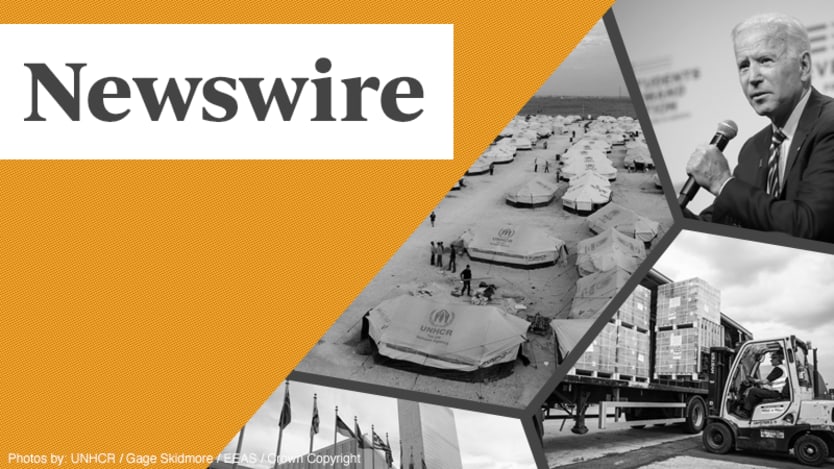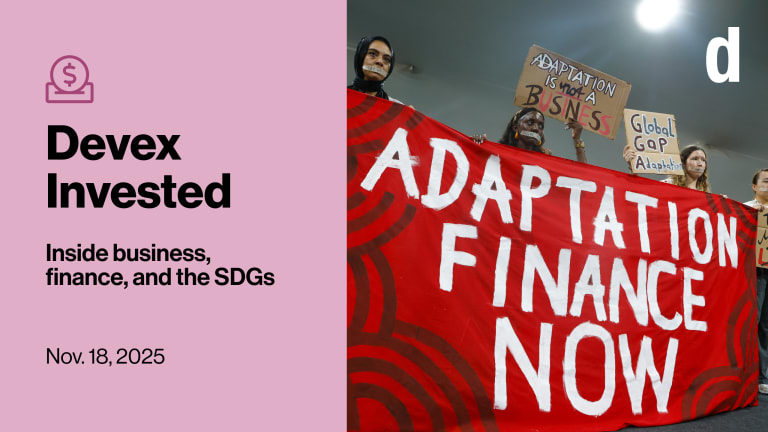
The saga of the little-known but highly controversial United Nations agency UNOPS has a new chapter. We have the latest on all the juicy details — including allegations of fraud, abuse of power, and a “culture of fear.”
Also in today’s edition: Afghanistan’s development outlook, and a deal on Zambia’s debt relief wavers.
Damning portrait
You may recall Devex broke the story in April about irregularities in a multimillion-dollar investment initiative spearheaded by the United Nations Office for Project Services, or UNOPS. Well, an independent probe by auditing giant KPMG has now found “indications of fraud” and a massive breakdown of financial oversight, my colleagues Colum Lynch and Shabtai Gold reveal.
KPMG’s Finland office paints a “damning portrait of managerial dysfunction by top managers” at UNOPS as it expanded its role into the “high-stakes, and lucrative, world of impact investing,” writes Colum, after he and Shabtai waded through multiple draft reports. “A culture of fear created an environment that allowed for management override of controls,” according to one of the two KPMG reports. “The way of working by top management further indicates an abuse of power.”
As part of its shift toward impact investing, UNOPS created an initiative called Sustainable Investments in Infrastructure and Innovation initiative, known as S3i. It was run by Vitaly Vanshelboim — who was placed on administrative leave during a U.N. oversight investigation into “possible misconduct” — and aimed to secure private financing to build 1.3 million affordable homes over the next decade in Ghana, Guinea, Nigeria, India, Pakistan, and across the Caribbean.
This is a preview of Newswire
Sign up to this newsletter for an inside look at the biggest stories in global development, in your inbox daily.
The reports allege that UNOPS officials ignored numerous “red flags” that trouble was brewing, including from a whistleblower who claimed contracts were overwhelmingly going to a single partner without competitive bidding or a proper vetting system.
In response to the reports, UNOPS issued a statement saying it “takes all findings extremely seriously and is committed to address all recommendations under the direction of the Executive Board.”
Scoop: Review slams 'culture of fear' and other failings at UNOPS
Recap: What went wrong with UNOPS’ ambitious impact-investing initiative?
And: A Devex explainer giving you an inside look at the UNOPS scandal.
Fading confidence
65%
—That’s the proportion of households in Afghanistan expecting conditions to worsen over the next 12 months, according to a survey by the World Bank. Before U.S. and NATO forces withdrew, leaving the Taliban at the helm, only 26% of Afghans felt doom and gloom.
It’s already pretty dire. Two-thirds of households struggle to meet basic food needs, and as the coldest months of winter approach, rising food prices are a likely harbinger of how rough things may get, especially in central regions of the country, Shabtai tells me.
My colleague Jenny Lei Ravelo has a report on women’s rights-focused NGOs in the country that are struggling to find funding due to donor skepticism that the money will be used as intended. At the same time, her sources tell her gender-based violence and child marriage are on the rise, and some organizations are having to work under the radar to provide legal aid without angering Afghan authorities.
Underfunded and restricted: The struggle of Afghan women’s rights NGOs
Meanwhile, U.K. aid policy to Afghanistan between 2014 and 2020 received stinging criticism in a report from the Independent Commission for Aid Impact. ICAI found aid went to the Afghan security services, who were mostly involved in war-fighting, and “distorted the political process and contributed to entrenched corruption.”
COP-ing mechanism
Somalia — now in its fifth consecutive failed rainy season — is at the front lines of the climate emergency. Its government came to the 27th U.N. Climate Change Conference earlier this month with a mission to show the world it was serious about improving its governance, having just appointed its first climate change minister, in order to convince donors it is able to use climate finance effectively to respond to extreme weather, writes my colleague Sara Jerving.
Sara spoke with Dr. Mohamed Osman Mohamoud, national economic adviser and member of the Somali National Economic Council, about the reforms the government has undertaken to build “the right systems that donors can trust.”
Read: At COP 27, Somalia was on a mission to rebrand itself (Pro)
+ A Devex Pro membership brings you essential analysis, data-driven funding insights, and access to the world’s largest global development job board. Get these perks and more by signing up to our 15-day free trial.
China shop
The deal on Zambia’s debt relief was heralded as a spot of bright news this year, with much hope that it would be a blueprint for other nations in trouble. But it seems China could be about to spoil it, as many had feared.
As we’ve reported, Zambia owes China about $6 billion, roughly a third of its external debt stock. However, Beijing is not happy about being forced to write down some of its debts and is now insisting the multilateral development banks, or MDBs, take losses too.
As Axios pointed out, the last Group of 20 communique had an odd footnote (Article 33, footnote 1, for those keeping track), saying “one member has divergent views on debt issues.” And that member is China.
So what ‘s the problem? The MDBs, to which Zambia owes $2.7 billion, lend at very cheap rates in part because they are “preferred creditors” and therefore are first in line to get paid back in full. China’s various lending arms, however, are not at the top of the stack.
ICYMI: Zambia eyes $8.4B relief, but worries crisis only being delayed
In other news
Due to the lingering impacts of the COVID-19 pandemic and high inflation, Latin America is experiencing a rise in extreme poverty, which is expected to affect 82 million people. [France 24]
The U.N. Human Rights Council will launch a “fact-finding mission” to investigate alleged rights violations, particularly those affecting women and children, following reports on Iran’s crackdown against peaceful protesters. [AP News]
Health officials are anticipating an increase in cholera cases as the rainy season approaches in Malawi, though a second round of vaccines delivered to the country has not yet been rolled out. [Reuters]
Sign up to Newswire for an inside look at the biggest stories in global development.








